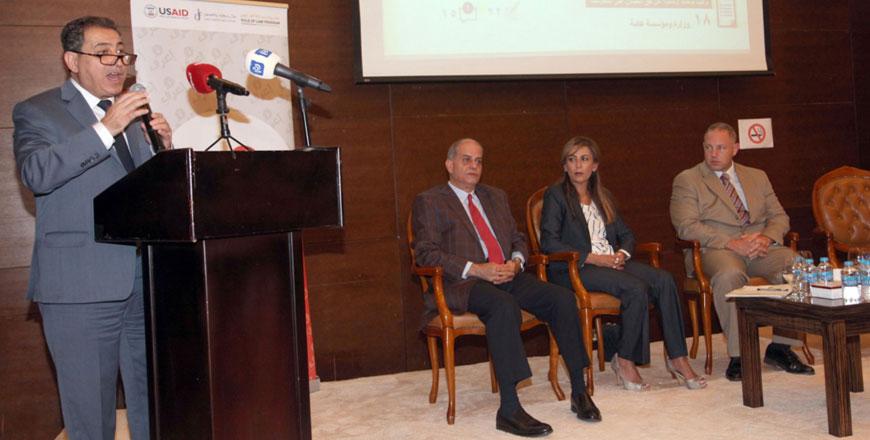You are here
'Many efforts exerted to ensure citizens, media's easy access to information'
By Rana Husseini - Aug 16,2018 - Last updated at Aug 16,2018

Officials speak at the Iref meeting in Amman on Wednesday (Petra photo)
AMMAN — Minister of State for Media Affairs Jumana Ghunaimat on Wednesday reiterated the government’s commitment to ensure easy access of information to the media and public alike.
“The government is working hard on drafting strategies to keep citizens and the media informed, and provide them with accurate facts to combat false information and rumours that keep circulating in media outlets, including social media,” Ghunaimat said.
The minister, who was deputising for Prime Minister Omar Razzaz, made her remarks during a meeting entitled Iref ("know" in Arabic), held by the Centre for Defending Freedom of Journalists (CDFJ) to strengthen transparency and the right to knowledge.
Ensuring the correct flow of information is "one of the most powerful tools to combat extremist ideologies and isolate them while at the same time working to increase people’s knowledge and openness about various topics,” Ghunaimat, who is also the government spokesperson, said.
“The government has recently launched a new electronic platform dubbed 'It’s Your Right to Know' to issue around-the-clock news in the most professional manner because we believe in people’s right to be informed and updated about sensitive and delicate issues,” she added, noting that this was also His Majesty King Abdullah’s key message during a meeting with the government last week.
On August 5, King Abdullah, who chaired part of a Cabinet meeting at the Prime Ministry, urged the government “to serve citizens and maintain direct outreach to the public to follow up on their concerns and needs”.
The King also commented on the spread of rumours and character assassination, calling for cooperation and further efforts to counter these practices.
Character assassination and attempts to stoke sedition are "unacceptable", His Majesty underscored, emphasising the importance of transparency in combating poverty, unemployment, wasta (nepotism) and corruption.
In Jordan, the Access to Information Law aims to facilitate the public’s access to official documents, granting access to almost all types of information except those classified as “secret”, as per legislation on protecting state documents and secrets, said CDFJ President Nidal Mansour.
“We do have a law to deal with access to information that has been around for over 10 years now but it had a lot of loopholes and was not properly implemented; and there are many officials who do not know it exists,” Mansour explained.
"That is why the centre conducted several activities, as part of Iref project, including holding training workshops and issuing booklets, to press the government to improve the law while at the same time better communicating with government officials for information and statements," he added.
The three-year project, which is being implemented in partnership with USAID’s rule of law project, seeks to help draw the best practices necessary to provide information to visitors of public departments and to help institutionalise mechanisms of classifying documents.
It also aims to develop the use of technology as a platform for the voluntary disclosure of information.
The CDFJ has also been working with the King Abdullah II Centre for Excellence to include this right among the criteria for the King Abdullah II Award for Excellence in Government Performance and Transparency, Mansour noted.
Government Coordinator for Human Rights Basel Tarawneh stressed the government’s commitment to ensure it is open, transparent and vocal about all matters related to human rights and others that concerns the citizen’s well-being.
“We constantly strive to be more open and transparent with the media and with international organisations abroad, and this is reflected in all the reports that are prepared by local organisations and my office,” Tarawneh stated.
Meanwhile, Director of the USAID’s Democracy, Rights and Governance Office Sean Osner, praised the work of the CDFJ and the government’s commitment towards ensuring the right of information to the media and its citizens.
“These steps are part of the good governance that is directly connected with the key pillars of democracy and human rights,” Osner said, adding “Jordan was the first Arab country to enact an access to information law and USAID reiterates its commitment to supporting Iref as a pioneering scheme towards better transparency."
Related Articles
AMMAN – Access to information is a right, not a luxury, which improves transparency, supports efficient public administration and helps comb
AMMAN — The Centre for Defending Freedom of Journalists (CDFJ) on Monday is scheduled to launch the Iref (know) project to enhance transpare
AMMAN — Centre for Defending Freedom of Journalists (CDFJ) President Nidal Mansour has expressed hope that the King Abdullah II Centre for E











